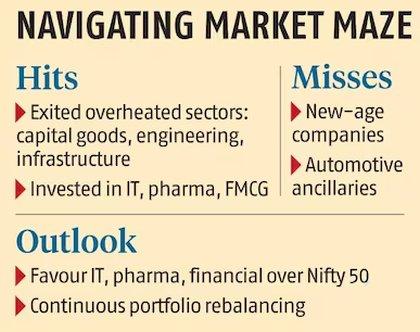'The biggest near-term risk to Indian equities is the outflow of investments to China as tactical trades by foreign investors.'

It has been a choppy ride for the markets. As they prepare for the July-September quarter results for 2024-2025 (FY25), Gaurav Dua, senior vice-president and head of capital market strategy at Sharekhan by BNP Paribas, tells Puneet Wadhwa/Business Standard in an e-mail interview that, as a strategy, they have gradually taken money off the table from overheated sectors like capital goods, engineering, and infrastructure and increased exposure to information technology services, pharmaceutical and fast-moving consumer goods.
What's your market outlook for the next few months?
The markets had a very strong rally after bottoming out following the general election in early June 2024.
Therefore, it would be healthy for them to take a breather to absorb the gains ahead of key events globally and domestically.
Nifty typically experiences a pullback of 5 to 8 per cent a couple of times each year, and investors need to take that in stride.
However, the pain could be more severe in the broader markets, as valuations are quite stretched in certain pockets of small and microcap stocks.
Are markets comfortable with the current level of crude oil prices?
The crude oil price was surprisingly soft in September, despite rising geopolitical issues in West Asia.
However, the trend seems to have reversed with the escalation of tensions.
If crude oil prices rise above the $85 to $90 per barrel range, it could erode Indian market sentiment.

IMAGE: Gaurav Dua.
Photograph: Kind courtesy Gaurav Dua/X
To what extent is the worsening geopolitical situation priced in?
Past experiences show that armed conflicts limited to a particular region tend to have a temporary impact on equity markets.
Moreover, it is difficult to anticipate the extent of escalation in any conflict.
Therefore, investors should monitor the fallout of conflicts in terms of changes in energy prices or input costs rather than analyse the geopolitical issues themselves.
In fact, the biggest near-term risk to Indian equities is the outflow of investments to China as tactical trades by foreign investors.
China has announced a slew of measures to stimulate its economy, and the valuations in the Chinese equity market are relatively comfortable.
There are also other important events to consider, such as the elections in the US and the Q2FY25 results domestically.
Globally, the outcome of the US elections will be closely watched, along with progress on the rate-cut cycle.
Have market expectations from the Bharatiya Janata Party risen after the outcome of the Haryana state polls?
The state elections following the national elections were seen as a litmus test for the BJP.
The outcome of the Haryana election was surprisingly positive and exceeded Street expectations.
This could energise the BJP cadre for the upcoming polls in Delhi and Maharashtra.
Consequently, Street expectations have risen, with the party expected to reaffirm the Haryana magic in Maharashtra as well.
An upset in Maharashtra could weaken investor sentiment.

What are your expectations for the September quarter results season?
The earnings slowdown is likely to persist in Q2FY25 after a soft earnings season in the first quarter.
Consensus estimates a growth of 3.5 to 4 per cent in Nifty earnings for Q2FY25.
Therefore, we see an increased risk of a downgrade in consensus earnings estimates for Nifty over FY25 and 2025 to 2026.
The major drag on earnings growth is expected to come from building materials (cement and steel), oil and gas, and specialty chemicals.
Conversely, we anticipate double-digit earnings growth in consumer staples, IT services, telecommunications, and capital goods sectors.
Earnings in the banking sector are also expected to moderate due to pressure on margins and potential elevated slippages in the unsecured loan book.
Overall, we expect the results season to see stock-specific volatility.
Can we expect liquidity to get diverted from the markets, especially small and midcap segments, to the primary markets?
There is an impressive lineup of initial public offerings over the next couple of months.
This will certainly attract investors. However, we expect domestic inflows, particularly systematic investment plans in smallcap/thematic mutual funds, to sustain a healthy level and provide strong support to equity markets.
Therefore, the influx of IPOs might just add pressure rather than serve as a major trigger for a correction in the broader markets.
What have been your hits and misses thus far in calendar year 2024?
In recent months, we have gradually taken money off the table from overheated sectors like capital goods, engineering, and infrastructure, while increasing our exposure to IT services, pharma, and FMCG, which has played out well for us.
We believe that IT services, pharma, and financial sectors could outperform the Nifty 50 over the next six to 12 months.
In terms of misses, we had limited exposure to some new-age companies and also missed a few interesting opportunities in the automotive ancillary space.
Disclaimer: This article is meant for information purposes only. This article and information do not constitute a distribution, an endorsement, an investment advice, an offer to buy or sell or the solicitation of an offer to buy or sell any securities/schemes or any other financial products/investment products mentioned in this article to influence the opinion or behaviour of the investors/recipients.
Any use of the information/any investment and investment related decisions of the investors/recipients are at their sole discretion and risk. Any advice herein is made on a general basis and does not take into account the specific investment objectives of the specific person or group of persons. Opinions expressed herein are subject to change without notice.
Feature Presentation: Rajesh Alva/Rediff.com











